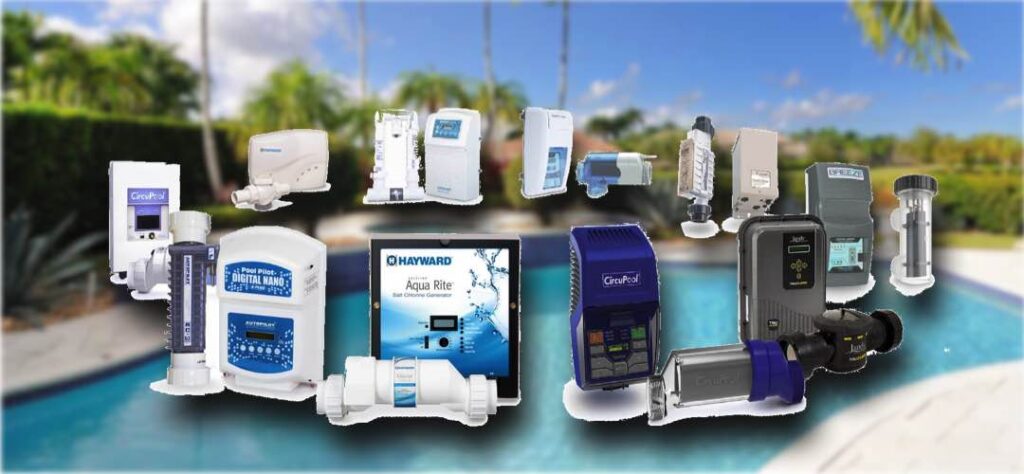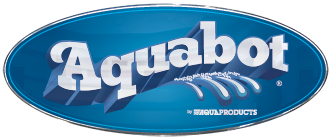Salt Systems
Home / Pool Equipment / Salt Water Pools
Swimming Pool Salt Systems Port Saint Lucie
Swimming Pool Salt Systems

All About Salt Systems
Chlorinators aka Chlorine Generators aka Salt Cells
Saltwater pools, powered by salt chlorinators, are gaining popularity for good reasons. They offer a luxurious swimming experience while significantly improving the consistency of the water qualtity.
Understanding Salt Systems
Salt chlorine generators work by converting salt into chlorine for sanitizing pool water. Through electrolysis, a small amount of ordinary salt is transformed into pure chlorine. Importantly, the salt is continuously reused in this process.
The Science Behind Salt Chlorination
A salt chlorinator comprises two main components:
- the salt cell, which converts salt into chlorine, and
- the control box, which regulates the process.
Installed on the pool’s plumbing return line, the salt cell utilizes an electrical charge generated by the control box to convert dissolved salt (NaCl) into chlorine (Cl2). This chlorinated water is then distributed evenly throughout the pool, effectively sanitizing it. Afterward, the chlorine reverts back to salt, until again passing through the salt cell.
The salt in pool water undergoes a perpetual cycle between salt and chlorine and is never consumed or evaporated. Therefore, replenishing pool salt is only necessary due to factors like backwashing, splash out, or rainstorm overflows.
Pros and Cons of Salt Chlorination
While salt chlorinators offer numerous benefits, not all pool structures are suitable for them. Concrete pools may suffer from increased abrasion, while vinyl liner pools can face rust issues. In contrast, composite fiberglass pools are ideally suited for salt chlorination due to their durability and non-porous surfaces.
Tips for Salt Cell Maintenance
Regular inspection and scale removal are necessary for maintaining salt cells’ effectiveness and longevity. Additionally, adding the right amount of salt to the pool is crucial for optimal performance.
Salt Chlorination FAQs
– Does Salt Chlorinate Pool Water?
No, salt itself doesn’t sanitize pool water; it’s the chlorine generated from salt by the salt chlorinator that sanitizes the water.
– Will My Water be Salty?
No, when salt levels are properly maintained, the taste should be minimal. The salt passes through the chlorinator’s electrolytic plates to form chlorine, effectively preventing the formation of bacteria and algae.
– Proper pool water salt range is 2,700 to 3,400 PPM (parts per million).
– Will I Still Have to Purchase Store-bought Chlorine?
In well-maintained saltwater pools, the need for store-bought chlorine is significantly reduced or eliminated altogether.
Understanding Water Chemistry in Salt Water Pools
Maintaining proper water chemistry is crucial for clean and healthy pool water. Balancing levels of Free Chlorine and Combined Chlorine, as well as monitoring pH levels, is essential for optimal pool maintenance.
Choosing the Right Salt Chlorinator
For those considering a salt chlorinator, Hayward Pool Products offers a range of high-quality options to suit various needs and budgets.
The Ideal Combination
Salt chlorination is preferred for its cost-effectiveness, reduced maintenance, and the luxurious swimming experience it provides. Moreover, the health benefits of swimming in properly chlorinated saltwater are noteworthy.
Debunking Myths About Salt Chlorination
Despite its popularity, salt chlorination is often misunderstood.
Common myths include the need to drain the pool when switching to salt chlorination, the misconception that salt itself is the sanitizer, and the belief that salt evaporates. Proper water chemistry management remains essential for salt chlorinated pools, as with any other type of pool.
Financing Available!








Routine residential swimming pool maintenance, cleaning and inspection are all essential to protecting your loved ones and safeguarding your investment. Let our team of highly trained technicians take the stressful and technical duties of pool care off your to-do list.
-
1391 NW Saint Lucie West Blvd #397
Port Saint Lucie, FL 34986 - (772) 828-2281
- Info@tikinui.com
- Mon - Fri : 09:00 AM - 5:00 PM
Newsletter
Just Visiting? Welcome! Take a second and sign up for our Residential Swimming Pool Newsletter.
Show Your Pool Some Aloha©
Copyright 2023 – All Rights Reserved

